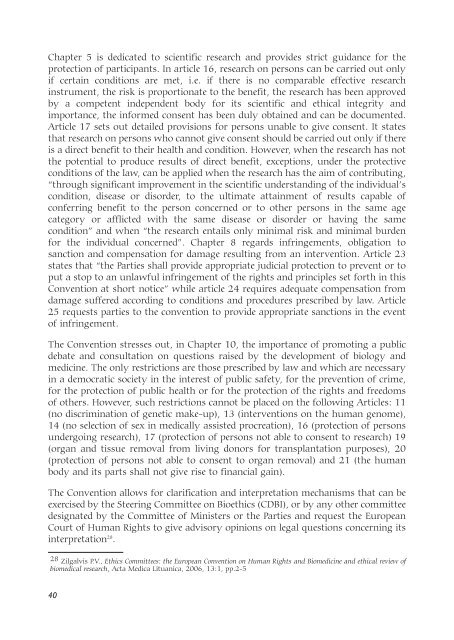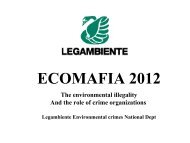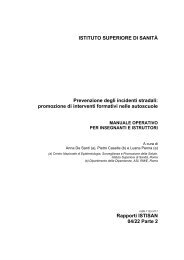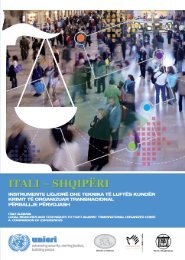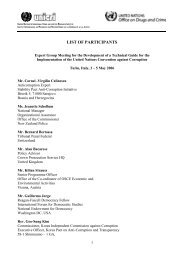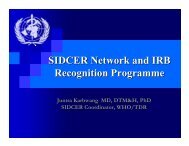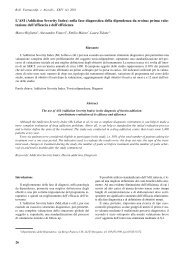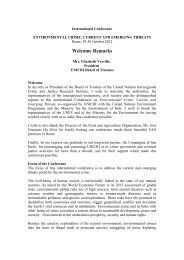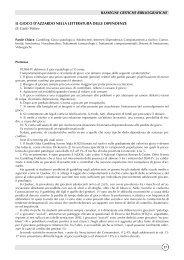Biomedical Research in Developing Countries - UNICRI
Biomedical Research in Developing Countries - UNICRI
Biomedical Research in Developing Countries - UNICRI
You also want an ePaper? Increase the reach of your titles
YUMPU automatically turns print PDFs into web optimized ePapers that Google loves.
Chapter 5 is dedicated to scientific research and provides strict guidance for the<br />
protection of participants. In article 16, research on persons can be carried out only<br />
if certa<strong>in</strong> conditions are met, i.e. if there is no comparable effective research<br />
<strong>in</strong>strument, the risk is proportionate to the benefit, the research has been approved<br />
by a competent <strong>in</strong>dependent body for its scientific and ethical <strong>in</strong>tegrity and<br />
importance, the <strong>in</strong>formed consent has been duly obta<strong>in</strong>ed and can be documented.<br />
Article 17 sets out detailed provisions for persons unable to give consent. It states<br />
that research on persons who cannot give consent should be carried out only if there<br />
is a direct benefit to their health and condition. However, when the research has not<br />
the potential to produce results of direct benefit, exceptions, under the protective<br />
conditions of the law, can be applied when the research has the aim of contribut<strong>in</strong>g,<br />
“through significant improvement <strong>in</strong> the scientific understand<strong>in</strong>g of the <strong>in</strong>dividual’s<br />
condition, disease or disorder, to the ultimate atta<strong>in</strong>ment of results capable of<br />
conferr<strong>in</strong>g benefit to the person concerned or to other persons <strong>in</strong> the same age<br />
category or afflicted with the same disease or disorder or hav<strong>in</strong>g the same<br />
condition” and when “the research entails only m<strong>in</strong>imal risk and m<strong>in</strong>imal burden<br />
for the <strong>in</strong>dividual concerned”. Chapter 8 regards <strong>in</strong>fr<strong>in</strong>gements, obligation to<br />
sanction and compensation for damage result<strong>in</strong>g from an <strong>in</strong>tervention. Article 23<br />
states that “the Parties shall provide appropriate judicial protection to prevent or to<br />
put a stop to an unlawful <strong>in</strong>fr<strong>in</strong>gement of the rights and pr<strong>in</strong>ciples set forth <strong>in</strong> this<br />
Convention at short notice” while article 24 requires adequate compensation from<br />
damage suffered accord<strong>in</strong>g to conditions and procedures prescribed by law. Article<br />
25 requests parties to the convention to provide appropriate sanctions <strong>in</strong> the event<br />
of <strong>in</strong>fr<strong>in</strong>gement.<br />
The Convention stresses out, <strong>in</strong> Chapter 10, the importance of promot<strong>in</strong>g a public<br />
debate and consultation on questions raised by the development of biology and<br />
medic<strong>in</strong>e. The only restrictions are those prescribed by law and which are necessary<br />
<strong>in</strong> a democratic society <strong>in</strong> the <strong>in</strong>terest of public safety, for the prevention of crime,<br />
for the protection of public health or for the protection of the rights and freedoms<br />
of others. However, such restrictions cannot be placed on the follow<strong>in</strong>g Articles: 11<br />
(no discrim<strong>in</strong>ation of genetic make-up), 13 (<strong>in</strong>terventions on the human genome),<br />
14 (no selection of sex <strong>in</strong> medically assisted procreation), 16 (protection of persons<br />
undergo<strong>in</strong>g research), 17 (protection of persons not able to consent to research) 19<br />
(organ and tissue removal from liv<strong>in</strong>g donors for transplantation purposes), 20<br />
(protection of persons not able to consent to organ removal) and 21 (the human<br />
body and its parts shall not give rise to f<strong>in</strong>ancial ga<strong>in</strong>).<br />
The Convention allows for clarification and <strong>in</strong>terpretation mechanisms that can be<br />
exercised by the Steer<strong>in</strong>g Committee on Bioethics (CDBI), or by any other committee<br />
designated by the Committee of M<strong>in</strong>isters or the Parties and request the European<br />
Court of Human Rights to give advisory op<strong>in</strong>ions on legal questions concern<strong>in</strong>g its<br />
<strong>in</strong>terpretation 28 .<br />
28 Zilgalvis P.V., Ethics Committees: the European Convention on Human Rights and Biomedic<strong>in</strong>e and ethical review of<br />
biomedical research, Acta Medica Lituanica, 2006, 13:1, pp.2-5<br />
40


